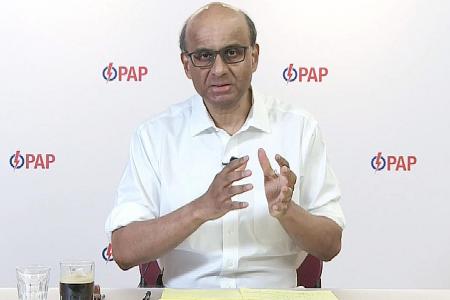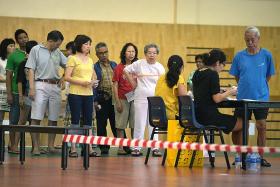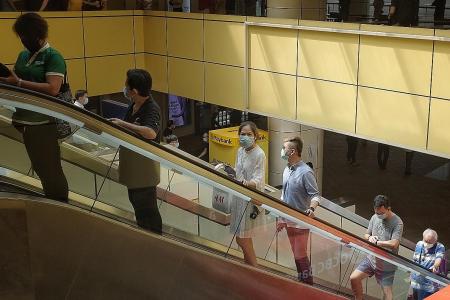Singapore can be more inclusive post-Covid: Tharman
Tharman says Government has key role, but people also have parts to play
Singapore can emerge from the Covid-19 crisis as a better and more inclusive society, which allows everyone to move up an escalator of rising skills and wages to better lives, said Senior Minister Tharman Shanmugaratnam.
To do so, the Government would have to play a key role, making deeper interventions earlier, to help level up children from less fortunate families from an earlier stage in life.
There would also be more help for workers to boost their productivity so that they continue to see their skills and wages move up over the years, said the Coordinating Minister for Social Policies.
While government policies are important, Singapore should retain a social ethos where people take pride in standing on their own feet while taking responsibility for each other.
In a speech on strategies for an inclusive society and social mobility, livestreamed on the People's Action Party's Facebook page yesterday, Mr Tharman outlined Singapore's particular approach towards tackling inequality and ensuring security through every stage of life.
"The aim of all our strategies, economic and social, is to have a more fair and just society, where young people have hope, regardless of what social backgrounds they come from... where everyone can advance in their careers regardless of what qualifications they start with, and where our seniors can look forward to living life fully in retirement, and living life with a sense of security," said Mr Tharman.
Stressing the outbreak had made this a more important issue, since it was "fracturing societies", he said this goal could be achieved only through programmes that can be sustained across generations.
Since social mobility is key to Singapore's fabric, and most inequalities kick in when children are young, the Government is levelling the playing field with plans to double expenditure in the pre-school sector.
For those in working life, Mr Tharman highlighted another Singaporean approach that had stood it in good stead: "a massive infusion of skills at every stage of one's career".
Singapore has also managed to keep unemployment numbers much lower than other developed countries even during the crisis. The wages of its average worker have risen by a third over the past decade. The wages of the low-income workers have risen even more.
"Fundamentally, because we have raised productivity."
Finally, he touched on the issue of security for seniors.
Mr Tharman said in every election, there will be politicians who make "very nice sounding promises" on what should be done to help seniors, including for Central Provident Fund payouts to start earlier or for the Government to pay more of Singaporeans' healthcare costs.
But many of these measures will only end up hurting the people they are trying to help, he added, resulting in higher tax rates for middle-income households as nothing comes for free.
"Some promises look appealing, but they actually lead to greater inequality over time," he said. "Think hard about the need for a fair system, a progressive system, and a sustainable system. And that's basically what we're trying to achieve in Singapore."
INVOLVED
He urged the younger generation to be more involved in society and take part in the Singapore Together movement, which Deputy Prime Minister Heng Swee Keat launched last year, for citizens to actively help shape policies.
"For our younger generation, in particular, this is actually a challenge for a generation: building an inclusive society, that doesn't just mimic efforts in other societies, but does it our way - does it in a way that doesn't impose a heavy burden on Singaporeans at large," he said. "It's not about the Government; it's about Singapore Together. Find your niche, find your passion, the areas you want to work in. And let's help spiral up our whole system, our whole society."
Government seeks to help kids from all walks of life do well in school: Senior Minister
Most of life's inequalities can be traced back to people's childhood and that is why the Government's efforts on social mobility start when Singaporeans are young, said Senior Minister Tharman Shanmugaratnam yesterday.
Deep interventions are critical in the early years to spur children from all walks of life to do well in school, he added.
"We are determined to make every effort to help kids who start off with low-income families to have hope in life, to have confidence, and to enter primary school brimming with enthusiasm. It can be done," Mr Tharman said in the People's Action Party's talk show series on Facebook called Straight Talk.
One way the Government has been doing this is by raising the quality of pre-school education, he added, pointing out that it is doubling its expenditure in the next few years.
He also said in five years, 80 per cent of pre-school education will be supported by the Government, up from 30 per cent eight years ago.
Last year, the Early Childhood Development Agency announced that annual spending by the Government on the early childhood sector is set to double to more than $2 billion in the next few years. This is up from the $1 billion spent in 2018.
Another move to lift the standards in the pre-school sector is teacher training, Mr Tharman said, noting the National Institute of Early Childhood Development took in its first batch of trainees last year.
Beyond these efforts, targeted help for children is available too, added Mr Tharman.
He held up the KidStart programme that provides advice and support to families on aspects of bringing up children like nutrition. It was introduced in 2016. About 5,000 children are set to go through it in the next few years, he said.
BEST IN CLASS
Mr Tharman said Singapore has one of the best school systems in the world and the country ends up at the top of the tables for subjects such as reading and mathematics.
But it is not just its averages that are high, he added.
"Our children from lower income backgrounds substantially outperform children from lower income backgrounds in the advanced countries."
In fact, they do better than the average child in countries such as Switzerland, France, Germany and Sweden, he added.
Work has also gone into preventing a digital divide in Singapore, said Mr Tharman, noting that no matter how poor a family is, every child will have broadband Internet at home, which will cost as low as $6 a month.
Each child will also have a computer at home, and if they are on the Education Ministry's financial aid scheme, they will not have to pay for one.
Yesterday, Mr Tharman pointed out the differentiation between children while young is being reduced by the Government, citing the abolishment of primary school streaming more than 10 years ago.
In the same vein, secondary schools are moving away from streaming and towards full subject-based banding.
"It enables students to mix more with each other... and never think that 'I'm stronger than someone else' or 'I'm weaker than someone else' as you grow up," he said.
Every working Singaporean needs to be on 'moving escalator': Tharman
Every Singaporean worker needs to be on a "moving escalator" of better skills and income, said Senior Minister Tharman Shanmugaratnam.
The Covid-19 crisis poses special challenges as a generation of young people entering the workforce may miss their first step onto the escalator, he said yesterday.
At the same time, middle-aged and mature workers may find that the escalator has suddenly stopped, Mr Tharman added.
He said: "We will make sure that doesn't happen in Singapore. Every generation must be on a moving escalator."
Mr Tharman helms the People's Action Party (PAP) slate in Jurong GRC in Friday's election.
Speaking in the live show Straight Talk With PAP broadcast from the party's headquarters, he said the first order of business in the coronavirus pandemic is to stop unemployment from spiralling upwards here.
In Singapore, unemployment has gone up by fewer than 10,000 people, he added.
He compared this with places such as Hong Kong, Germany and the US, where unemployment was also previously low - at about 3 per cent - but has since shot up during the crisis.
"In Germany, it's 6.4 per cent," he said. "In Hong Kong, it's close to 6 per cent. In the US, it's at about 13 per cent, although the economists say the true figure is more like 17, 18 per cent."
Had Singapore experienced the same rise in joblessness as Hong Kong and Germany, which are "well-run economies", Mr Tharman estimated that there would be about 60,000 to 70,000 more Singaporeans out of work.
He said: "If we had the increase in unemployment that the US has seen, we would have today well over 250,000 Singaporeans becoming unemployed."
Government crisis initiatives such as the Jobs Support Scheme have helped with this, he said, but it takes more than that. Germany, for instance, has an equivalent programme, Kurzarbeit, as does Hong Kong.
Singapore has avoided what these economies are going through because employers and workers here have trust in the system, he said.
"Singaporeans themselves are responsible for this state of affairs of keeping unemployment down because they themselves have been skilling themselves over the years and are playing their part.
"So that's our system - tripartite coordination, trust in each other, and everyone knowing that the Government will do what it takes to ensure that we do not see what happens in all these countries," he said.
Mr Tharman said it is far better to put government resources into subsidising jobs and skills than into subsidising unemployment, even though both are aimed at helping the jobless.
The jobs and skills package aims get them back into the workplace, ideally for a permanent job, or - if there are not enough of these in the short term - then at least on an attachment, Mr Tharman said.
Inequality will widen if government pays for everyone: Tharman
A system of universal benefits where the Government pays for everyone will lead to greater inequality and an increase in taxes for the middle class, said Senior Minister Tharman Shanmugaratnam.
Addressing calls to change the way Singapore taxes citizens to boost revenue, Mr Tharman said it may seem appealing but in fact, such a system will widen the gap between the haves and have nots.
Speaking yesterday during the PAP's Straight Talk series, he said: "Because if the Government has to pay for everyone, it means the better-off people get the same benefits as the poor.
"It also means, and we've seen this in so many societies, that you end up with higher taxes on the middle income group."
The rich can pay more taxes to fund such a system, Mr Tharman added, but "there's no way in which the sums will add up without also raising taxes significantly for the middle income group".
He said that is what has happened in some advanced countries, which people sometimes think of as "some sort of dream society".
Mr Tharman, who is also Coordinating Minister for Social Policies, said the Singapore way is to keep to a system where taxes on the middle class remain low.
Taxes will of course go up as society gets older, "because our healthcare expenditures will go up", he added.
But the idea is always to "try to keep taxes as low as possible on the middle class, and use government revenues to help those who need it most, which is the poor, the lower middle-income group, and to some extent, the middle-income group as a whole", he said.
'NOTHING IS FOR FREE'
If the Government has to pay for everyone's healthcare, or if it has to subsidise other social schemes, these costs are not just passed to the Government, but passed on to everyone as "nothing is for free", he added.
In his speech, live-streamed on Facebook, Mr Tharman said: "Don't just raise taxes across the board (so that) the Government should pay for everything. It's a very important point.
"Some promises look appealing, but they actually lead to greater inequality over time." - THE STRAITS TIMES
Progressive Wage Model better than a minimum wage: Tharman
The Progressive Wage Model Singapore has in place is better than a minimum wage, said Senior Minister Tharman Shanmugaratnam in a live talk show yesterday.
It is a ladder, of which a minimum wage would only be the first rung, he said.
Opposition parties such as the Workers' Party and the Singapore Democratic Party have lobbied for minimum wage during the hustings, to better support low-income earners.
Mr Tharman, however, argued that the Progressive Wage Model is working.
The model, which was first made mandatory for the cleaning sector in 2015, sets out the minimum pay for different job levels and pegs wage increases to a skills ladder for cleaners, security officers and landscape workers.
There are plans to extend it to the lift maintenance and bus industries, and eventually to all sectors.
He said low-wage workers in the 20th percentile of the income ladder have seen an increase in wages of close to 40 per cent in real terms over the last 10 years.
The pay of these workers used to be about $1,500 a decade ago, but is now $2,500. Adjusted for inflation, he said, it is close to a 40 per cent increase.
On top of this, the Government adds Workfare benefits to their wages, which, in addition to special employment credit, is an extra 40 per cent of what their employers pay them.
"This is not growth at all costs, as is sometimes claimed," he said.
"It's growth to provide quality jobs for every Singaporean, and particularly for those who start off with low-paid jobs.
"It is growth to enable them to move up the ladder, with skills, better respect for the job, and a sense that they are able to contribute together with everyone else."
He cautioned that this has to be done with great care.
"Some countries achieve low unemployment by having everyone at work, but not seeing much improvement at work.
"Some countries go for restructuring of the whole economy; technology replaces workers, workers leave the workforce, unemployment goes up.
"You've got to avoid both those options." - THE STRAITS TIMES
Get The New Paper on your phone with the free TNP app. Download from the Apple App Store or Google Play Store now






